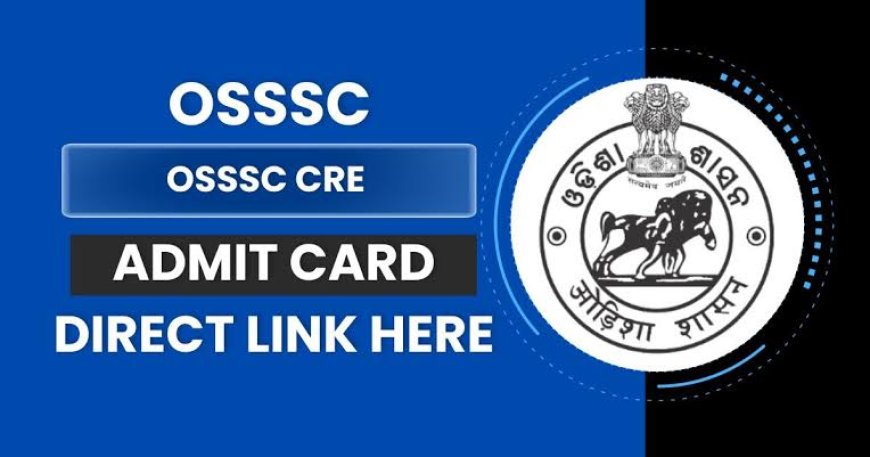Comprehensive Guide to RI, ARI, ICDS Supervisor, Amin, and SFS under CRE-2023 (IV) Exam Admit Card, Exam Procedure, and Demo Exam Instructions
Comprehensive Guide to RI, ARI, ICDS Supervisor, Amin, and SFS under CRE-2023 (IV) Exam Admit Card, Exam Procedure, and Demo Exam Instructions

The Combined Recruitment Examination 2023 (IV) is an important recruitment process designed to fill various government positions such as Revenue Inspector (RI), Assistant Revenue Inspector (ARI), ICDS Supervisor, Amin, and Senior Field Supervisor (SFS). Each of these roles plays a critical part in ensuring the smooth administration and development of government programs. This article provides a detailed guide covering the essential details about the admit card, exam procedure, and how to download the admit card as well as attempt the demo exam.
Overview of the CRE-2023 (IV) Positions
Revenue Inspector (RI)
Revenue Inspectors are responsible for overseeing revenue collection, maintaining land records, and resolving land disputes. They also play a key role in coordinating with other government departments for smooth operations regarding land and revenue issues.
Assistant Revenue Inspector (ARI)
The ARI assists the Revenue Inspector in daily tasks related to revenue collection, record maintenance, and report generation. This role involves a lot of fieldwork and coordination with different government agencies.
ICDS Supervisor
Integrated Child Development Services (ICDS) Supervisors oversee the implementation of the ICDS program, which is aimed at providing health, nutrition, and educational support to children and mothers in rural and urban areas. Their responsibilities include managing Anganwadi workers, monitoring the delivery of services, and reporting program progress.
Amin
Amins are responsible for the measurement of land, updating land records, and assisting in various land-related administrative tasks. They play an important role in maintaining land and revenue systems within the government.
Senior Field Supervisor (SFS)
Senior Field Supervisors are involved in overseeing various field-level government projects and programs. They ensure that tasks are performed efficiently, track project progress, and make recommendations for improvements.
CRE-2023 (IV) Exam Procedure
The recruitment exam under CRE-2023 (IV) follows a multi-stage process to evaluate the candidates for the positions of RI, ARI, ICDS Supervisor, Amin, and SFS. The exam is conducted in a fair and transparent manner with the aim of selecting the most deserving candidates.
Exam Structure
The exam pattern for each post varies slightly depending on the role. However, the general structure typically includes the following sections:
1. Written Examination:
Objective Questions: This section assesses the general knowledge, reasoning, numerical ability, and subject-specific knowledge relevant to the post.
Descriptive Section (for certain roles): Candidates may be required to write essays or responses on topics related to the job role.
2. Physical Efficiency Test (PET) (For RI, ARI, Amin, and SFS):
In roles like RI, ARI, and Amin, physical fitness is essential, so candidates may be required to pass a PET. This could include running, long jump, high jump, etc.
3. Document Verification:
Shortlisted candidates must present their documents, such as educational certificates, identity proof, and other necessary documents for verification.
4. Personal Interview (If applicable):
Some positions, like ICDS Supervisor, may require a personal interview round to assess the candidate’s personality and fit for the role.
Subjects Covered in the Written Exam
While the exact syllabus may vary for different posts, the general topics include:
General Knowledge: Current affairs, history, geography, Indian polity, economics, and science.
Mathematics/Numerical Ability: Arithmetic, algebra, geometry, and data interpretation.
Logical Reasoning: Analytical reasoning, puzzles, coding-decoding, syllogisms, etc.
English Language: Grammar, comprehension, vocabulary, sentence correction, etc.
Post-Specific Subjects: Law (for RI), Child Development and Nutrition (for ICDS Supervisor), and Land Measurement and Record Maintenance (for Amin).
Admit Card: Importance and How to Download
The admit card is a crucial document that allows candidates to appear for the exam. It contains important details such as the candidate's name, roll number, exam center, and reporting time. Without the admit card, a candidate will not be allowed to enter the examination hall. Therefore, it is essential to download and carry a hard copy of the admit card.
Steps to Download the CRE-2023 (IV) Admit Card
1. Visit the Official Website:
Go to the official website - https://www.osssc.gov.in/
2. Locate the Admit Card Section:
On the homepage, look for a section or link labeled "Admit Card" or "Download Admit Card." It may be prominently displayed or listed under the "Latest Announcements" or "Notifications" sections.
3. Login with Credentials:
Candidates will need to log in using their registration number, date of birth, or any other required credentials. This information would have been provided during the registration process.
4. Download and Print:
Once logged in, the admit card will be displayed. Download the PDF version and ensure that all the details are accurate. Print at least two copies of the admit card to avoid any last-minute issues.
Details to Check on the Admit Card
Personal Information: Name, date of birth, gender, and category (SC/ST/OBC/General).
Exam Details: Exam date, reporting time, and venue of the exam.
Instructions: Guidelines regarding what to bring (ID proof, photos), what items are restricted, and any other important instructions.
In case of any discrepancy, immediately contact the exam authority for rectification before the exam date.
How to Attempt the Demo Exam
To familiarize candidates with the exam format and reduce anxiety, a demo exam or mock test is often provided on the official website. Attempting this demo exam is crucial as it helps candidates understand the question pattern, interface, and navigation between sections in a computer-based test (CBT).
Steps to Attempt the Demo Exam
1. Visit the Official Portal:
Go to the official website where the demo test link will be provided. This is usually highlighted close to the admit card or exam notifications.
2. Login:
If required, enter your credentials such as your registration number or exam-specific login details to access the demo exam.
3. Familiarize Yourself with the Interface:
The demo exam typically mirrors the exact interface of the real exam. Here’s what you should get comfortable with:
Timer: Observe how the timer works and how much time you have for each section.
Navigation: Learn how to switch between questions and sections. This can be especially helpful in a time-limited exam to avoid wasting time.
Flagging Questions: In most online exams, candidates can flag questions to revisit them later. Practice this in the demo.
Submission: Know how to submit the test. Ensure that all sections are completed before hitting submit.
4. Attempt Questions:
Go through the demo questions seriously to assess your preparedness and to become comfortable with the type of questions. The questions in the demo exam may not necessarily appear in the real exam but will be similar in format and difficulty.
5. Review:
After completing the demo exam, review your performance. This will give you an idea of the areas you need to improve on before the real exam.
Benefits of Attempting the Demo Exam
Confidence Boost: Familiarity with the exam pattern reduces anxiety and boosts confidence.
Technical Know-How: Helps in understanding how to navigate the online interface, use the timer, and handle flagged questions.
Time Management: Allows candidates to practice completing the exam within the given time limit, an essential skill for success.
Exam Day Tips
1. Reach Early: Arrive at the exam center well in advance to avoid any last-minute rush.
2. Carry Necessary Documents: Ensure you have your admit card, a government-issued ID (Aadhar, PAN card, or driving license), and passport-sized photographs.
3. Follow Instructions: Carefully follow all the instructions provided by the invigilators. Violating any rules can lead to disqualification.
4. Stay Calm: Keep calm during the exam. If you face a difficult question, flag it and move on to avoid wasting time.
Conclusion
The CRE-2023 (IV) exam is an important step in securing government positions such as RI, ARI, ICDS Supervisor, Amin, and SFS. Candidates should pay close attention to downloading their admit cards on time, understanding the exam structure, and practicing through demo exams to improve their chances of success. By preparing thoroughly and staying calm on exam day, candidates can maximize their chances of performing well and securing a promising government job.





































